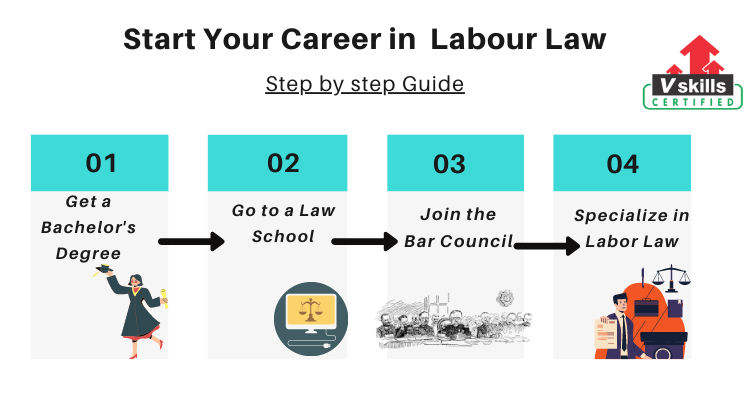Labor law analysts are employed by law firms and are in charge of developing and performing labour market analysis as well as reporting on labour market trends and predictions in specific market sectors. Furthermore, they keep a current and accurate database of statistical data related to socioeconomics and labour market forecasting in specific industries.
Let us analyze career prospects for Labour law.
What is Labour Law?
Labour law refers to the body of law that governs wages, remuneration, working conditions, labour unions, and industrial relations. In its broadest sense, the word also refers to social security and disability benefits. The elements of labour law, unlike the laws of contract, tort, or property, are less homogeneous than the rules regulating a specific legal relationship. In addition to individual contractual relationships arising from conventional jobs, labour law addresses statutory requirements and collective relationships, which are becoming increasingly relevant in mass-production economies, as well as legal relationships between organizations.
What do Professionals in Labour law do?
Representing employers in the private and public sectors, representing trade unions, representing individual workers, and working for federal and state regulatory agencies are all areas of practice in labour and employment law. Labor law, equal employment opportunities law, employment contracts, family and medical leave, military leave, wage and hour rules, unfair discharge, discrimination, occupational protection, covenants not to compete, employee benefits law, and workers’ compensation law are among the issues that attorneys address.
Labor and employment attorneys can advise clients about how to comply with federal laws enforced by the Department of Labor, the National Labor Relations Board, the Equal Employment Opportunity Commission (EEOC), and various state agencies, depending on their areas of practice. They can advise union or management clients on collective bargaining arrangements, grievance and arbitration procedures, contract administration issues, strikes and work stoppages, and contract administration issues.
They may represent employers or workers in cases involving discrimination, abuse, unfair termination, wage-hour violations, and family and medical leave. Employers may seek their advice on issues such as employee benefit law, disciplinary proceedings and terminations, disability accommodations, drug and alcohol testing, confidentiality agreements, workplace investigations, and unemployment compensation claims.
Career opportunities for Labour Lawyers
Law firms, labour unions, corporate law departments, state and local governments, employee benefit funds, consulting firms, and a variety of federal and state governmental regulatory agencies, such as the EEOC, Department of Labor, National Labor Relations Board, Office of Labor-Management Standards, National Mediation Board, and Federal Labor Relations Authority, can all employ labour and employment lawyers.
How to start your career as a Labour Lawyer?
Follow the below mentioned steps to start your career in law –
Get a Bachelor’s Degree
Earning a bachelor’s degree, which is required for law school, is the first step toward a career as a lawyer. There is no single best major for those who choose to go to law school. The most important factor to consider is picking a major that is exciting and demanding enough to motivate you to work hard and achieve good grades. Nonetheless, a career in law necessitates specific skills, such as the ability to learn, interpret, communicate, and write effectively, and majors and individual classes can assist students in developing these abilities. Culture, political science, public speaking, English, economics, and math are all subjects that can be beneficial.
Vskills also provide Online tutorials, certification courses and free practice tests for the same. You can check them out on our official site.
Go to Law School
Many law schools, including those accredited by the American Bar Association, require applicants to take the Law School Admission Test (LSAT). The LSAT consists of five multiple-choice sections and a writing exercise, each of which takes 35 minutes to complete. The exam assesses reading comprehension, logical thinking and analytical abilities, as well as the ability to assess others’ claims and reasoning. In the highly competitive world of law school admissions, grades play a significant role.
Join the Bar
Prospective lawyers must join their state bar association before practicing law, which is also known as being a licensed attorney. Individual states have different laws and procedures, but the key criteria include having a law degree and passing a multi-part bar exam in the United States. The Multistate Bar Examination, a 6-hour test of 200 multiple-choice questions covering civil law, criminal law, contracts, facts, property, and torts, is used in the majority of states. Furthermore, bar applicants are usually required to sit for a second day of exams, which can be multistate or locally devised. They are typically used to assess writing and legal skills.
Specialize in Labor Law
After passing the bar exam, a law school graduate may begin practicing law. Law firms, corporate legal teams, non-profit lobbying groups, labour unions, and federal, state, and local government agencies all have labour law roles. Labor attorneys can help with collective bargaining arrangements, employee complaints, and labour arbitration, as well as advising clients on their regulatory obligations. They may also look at issues like discrimination, workers’ compensation, pension and insurance programs, or health and safety in the workplace.
Continue advanced education
Continuing legal education is required in most states, either once a year or every few years. Bar societies and law schools provide continuing legal education. Other specialized legal societies, such as the NELA, deliver educational conferences and other activities that can be used to meet state requirements. Some lawyers may be able to earn required credits from online courses, depending on their state.
There are many ways for experienced lawyers to succeed in their careers. First, after years of practice, lawyers working inside a company will become ownership partners. Lawyers who have gained years of professional experience and connections may also start their own law firms. Experienced lawyers may also go on to become judges or law professors.
Market demand and average salary
An employment lawyer earns an average of $144,000 a year. Salaries, on the other hand, will vary from $65,000 to $175,000 a year. Big national companies with headquarters in metropolitan areas pay the highest salaries. Recent graduates are usually the lowest paying due to their lack of work experience.
Lawyers can choose from a range of job opportunities. They can work with private law firms or practise on their own. They can also work in the legal departments of private companies and non-profits. Some might also work for non-profit agencies that provide legal assistance to workers.
Because of the complexities of labour legislation in use in the United States, employment lawyers have a good chance of finding work. Budget constraints, on the other hand, can limit the number of new hires. The majority of work openings occur as a result of the retirement, resignation, or relocation of former employment lawyers. Employment lawyers often move companies in order to progress in their careers, whether by higher pay, more recognition, or different job responsibilities.
Conclusion
Jobs attorneys, also known as Employment Benefits Lawyers, play an important role in helping both workers and employers with a range of challenges and concerns that can occur in a diverse workplace. There are Civil Rights Plaque jobs legislation in effect at the federal, state, and local levels to ensure that workers are treated fairly. Since there are so many employment rules, employment attorneys usually specialize in only a few fields.
Get started and discover the career opportunities in the field of Labour Law. Hurry up and try free practice tests now offered by Vskills.in!



